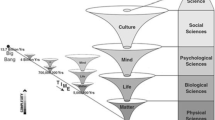Abstract
Viewing the science of behavior (behavior analysis) to be a natural science, radical behaviorism rejects any form of dualism, including subjective–objective or inner–outer dualism. Yet radical behaviorists often claim that treating private events as covert behavior and internal stimuli is necessary and important to behavior analysis. To the contrary, this paper argues that, compared with the rejection of dualism, private events constitute a trivial idea and are irrelevant to accounts of behavior. Viewed in the framework of evolutionary theory or for any practical purpose, behavior is commerce with the environment. By its very nature, behavior is extended in time. The temptation to posit private events arises when an activity is viewed in too small a time frame, obscuring what the activity does. When activities are viewed in an appropriately extended time frame, private events become irrelevant to the account. This insight provides the answer to many philosophical questions about thinking, sensing, and feeling. Confusion about private events arises in large part from failure to appreciate fully the radical implications of replacing mentalistic ideas about language with the concept of verbal behavior. Like other operant behavior, verbal behavior involves no agent and no hidden causes; like all natural events, it is caused by other natural events. In a science of behavior grounded in evolutionary theory, the same set of principles applies to verbal and nonverbal behavior and to human and nonhuman organisms.
Similar content being viewed by others
References
Baum, W. M. (1993). The status of private events in behavior analysis. Behavioral and Brain Sciences, 16, 644.
Baum, W. M. (1995). Radical behaviorism and the concept of agency. Behaviorology, 3, 93–106.
Baum, W. M. (2002). From molecular to molar: A paradigm shift in behavior analysis. Journal of the Experimental Analysis of Behavior, 78, 95–116.
Baum, W. M. (2004). Molar and molecular views of choice. Behavioural Processes, 66, 349–359.
Baum, W. M. (2005). Understanding behaviorism: Behavior, culture, and evolution (2nd ed.). Malden, MA: Blackwell.
Baum, W. M. (2011a). Evasion, private events, and pragmatism: A reply to Moore’s response to my review of Conceptual Foundations of Radical Behaviorism. Journal of the Experimental Analysis of Behavior, 95, 141–144.
Baum, W. M. (2011b). What is radical behaviorism? A review of Jay Moore’s Conceptual Foundations of Radical Behaviorism. Journal of the Experimental Analysis of Behavior, 95, 119–126.
Baum, W. M., & Heath, J. L. (1992). Behavioral explanations and intentional explanations in psychology. American Psychologist, 47, 1312–1317.
Catania, A. C., & Harnad, S. E. (1984). Canonical papers of B. F. Skinner. Behavioral and Brain Sciences, 7, 473–724.
Dawkins, R. (1989). The extended phenotype: The long reach of the gene. Oxford, UK: Oxford University Press.
Dennett, D. C. (1978). Skinner skinned. In Brainstorms: Philosophical essays on mind and psychology (pp. 53–70). Cambridge, MA: MIT Press.
Farrington, B. (1980). Greek science. Nottingham, UK: Spokesman. (Original work published 1944)
Herrnstein, R. J., Loveland, D. H., & Cable, C. (1976). Natural concepts in pigeons. Journal of Experimental Psychology: Animal Behavior Processes, 2, 285–302.
Hineline, P. (1995). The origins of environment-based psychological theory. In J. T. Todd & E. K. Morris (Eds.), Modern perspectives on B. F. Skinner and contemporary behaviorism (pp. 85–106). Westport, CT: Greenwood.
Lubinski, D., & Thompson, T. (1993). Species and individual differences in communication based on private states. Behavioral and Brain Sciences, 16, 627–680.
Moore, J. (1995). Radical behaviorism and the subjective–objective distinction. The Behavior Analyst, 18, 33–49.
Moore, J. (2008). Conceptual foundations of radical behaviorism. Cornwall-on-Hudson, NY: Sloan.
Rachlin, H. (1985). Pain and behavior. Behavioral and Brain Sciences, 8, 43–83.
Rachlin, H. (1994). Behavior and mind: The roots of modern psychology. New York: Oxford University Press.
Rachlin, H. (2003). Privacy. In K. A. Lattal & P. N. Chase (Eds.), Behavior theory and philosophy (pp. 187–201). New York: Kluwer Academic/Plenum.
Ryle, G. (1949). The concept of mind. Chicago: University of Chicago Press.
Skinner, B. F. (1945). The operational analysis of psychological terms. Psychological Review, 52, 270–277.
Skinner, B. F. (1953). Science and human behavior. New York: Macmillan.
Skinner, B. F. (1957). Verbal behavior. New York: Appleton-Century-Crofts.
Skinner, B. F. (1969). Behaviorism at fifty. In Contingencies of reinforcement: A theoretical analysis (pp. 221–268). New York: Appleton-Century-Crofts.
Skinner, B. F. (1974). About behaviorism. New York: Knopf.
Thompson, T. (2007). Relations among functional systems in behavior analysis. Journal of the Experimental Analysis of Behavior, 87, 423–440.
Watson, J. B. (1913). Psychology as the behaviorist views it. Psychological Review, 20, 158–177.
Watson, J. B. (1930). Behaviorism. New York: Norton.
Whorf, B. L. (1956). Language, thought, and reality. Cambridge, MA: MIT Press.
Zuriff, G. E. (1979). Ten inner causes. Behaviorism, 7, 1–8.
Author information
Authors and Affiliations
Corresponding author
Additional information
Earlier versions of this paper were presented at the annual meetings of the Association for Behavior Analysis, May 1995, and the American Psychological Association, August 1995. I thank Howard Rachlin for thoughtful comments on an earlier draft of the paper.
Rights and permissions
About this article
Cite this article
Baum, W.M. Behaviorism, private events, and the molar view of behavior. BEHAV ANALYST 34, 185–200 (2011). https://doi.org/10.1007/BF03392249
Published:
Issue Date:
DOI: https://doi.org/10.1007/BF03392249




